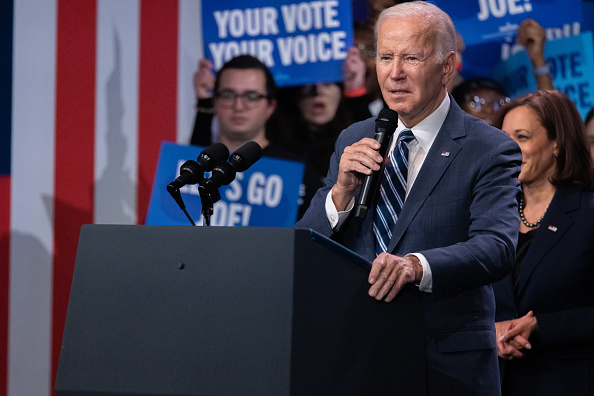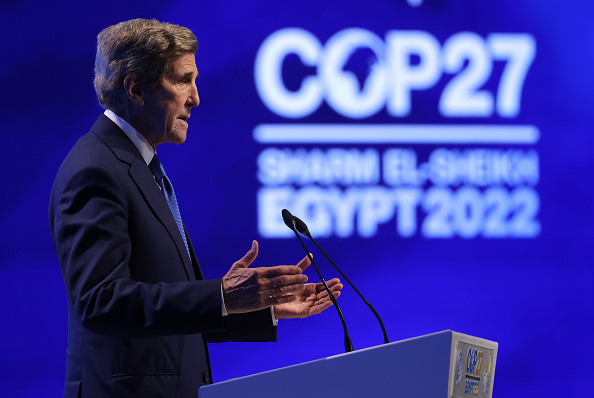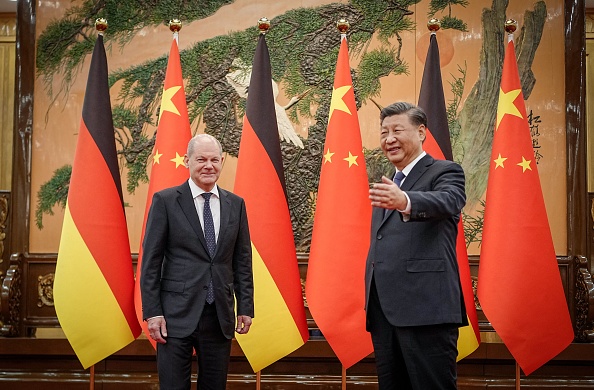
 Face to Face
Face to FacePresident Biden has departed for a week-long trip to focus on his major foreign policy priorities: climate change, U.S.-China relations and Russia's war on Ukraine. Biden's first stop is in Sharm el-Sheikh, Egypt, where he addressed the U.N. climate summit, laying out U.S. climate action priorities. He will then meet with South Asian leaders in Cambodia, followed by the G20 summit, where he will have an opportunity to meet the new British Prime Minister Rishi Sunak and Italian Prime Minister Giorgia Meloni.
On Monday, he will hold his first face-to-face meeting as President with Chinese President Xi Jinping, and while it is not expected to yield major breakthroughs or agreements, or even a joint statement, one senior administration official described it as a chance to "build a floor for the relationship" during an in-depth conversation.
Biden told reporters at a press conference that he won't make any concessions to China, but said he wants to set some limits.
"I've told them I'm looking for competition, not conflict," Biden said. "And so what I want to do with him when we talk is lay out what each of our red lines are, understand what he believes to be in the critical national interest of China, what I know to be the critical interest of the United States and to determine whether or not they conflict with one another."
Biden departed the U.S. with the news that House Democrats largely avoided the midterm rout they had feared Tuesday night, giving him a boost among foreign leaders of his staying power.
With Republicans expected to gain a small minority in the House, analysts anticipate that their party will likely take a tougher stance against Beijing and lean into their promises to economically "decouple" from China and defend Taiwan. There will likely be an increase in the number of congressional visits to Taiwan, which will create more stress in U.S.-China relations.
Read more in "The Bipartisan Race to be Tough on China," by Ted Galen Carpenter, a Senior Fellow at the Cato Institute.
 The Negotiating Room
The Negotiating RoomAt the U.N. climate negotiations this week, Biden is announcing a suite of new carbon reduction initiatives to restore U.S. leadership on climate action and to counter China's alignment with developing countries over issues related to climate reparations.
In Biden's address to delegates at COP27, he challenged China's claim to global leadership on climate action and claimed the higher ground on climate action over Xi, who won't be appearing in person. Some signs of thawing in the U.S.-China relationship also appeared, as John Kerry met with his counterpart Xie Zhenhua on the sidelines of the conference.
"There is no solution to the problem of climate change without China," White House climate envoy John Kerry said on Wednesday. "We stand ready to sit down with China on the climate issue and work together to solve what is not a bilateral issue, but what is a universal, global, existential issue."
Biden comes to COP27 with the Inflation Reduction Act that he signed in September as proof of America's commitment to addressing climate change, even as it faces pressure to answer developing countries' demands for more money from richer nations to fund climate projects and to cover the damage caused by extreme weather events. China, for its part, has called on wealthy nations to offer more support for developing countries that have the most to lose from climate change.
"I hope the conference this time will meet the demands of developing countries as much as possible, as it is held in Egypt, a developing country," said Xie Zhenhua, China's special envoy for climate change.
Meanwhile, China faces pressure to increasingly shift its economy towards renewable energy, and phase out coal production. China has committed to hitting peak coal consumption around 2025 and reaching peak carbon emissions five years later. By 2030, China has also promised to reduce carbon emissions per unit of GDP — its carbon intensity — by around two-thirds compared with 2005 levels. By 2060, it will become carbon neutral, meaning cutting its carbon dioxide emissions to nearly zero.
 A Change in Pace
A Change in PaceIn October, Xi Jinping secured an unprecedented third term as China's top leader. Now, he's stepping back onto the world stage - in person - in apparent efforts to increase his nation's global influence.
From the start of the pandemic until this September, Xi had remained within China's borders and drastically limited foreign guests. But analysts are noting a change in pace for the leader, with expected travel to various international summits this month, along with several recent state visits in Beijing.
Last week, Xi kicked off his third term with a flurry of diplomatic activity, meeting with the leaders of Tanzania, Pakistan, Vietnam, and Germany.
German Chancellor Olaf Scholz wrapped up his short visit to Beijing last Friday, where the two leaders agreed on enhanced dialogue and cooperation. They also released a joint statement opposing the use of nuclear weapons in Ukraine.
China and Vietnam also released a joint statement on further strengthening and deepening their comprehensive strategic cooperative partnership. Xi emphasized that China is ready to upgrade relations to strategic cooperation and partnership in talks with Tanzania and Pakistan as well.
China is playing a "constructive role in the global order restructuring that will win more recognition from the international community," reported Beijing's state-run publication, the Global Times.
Now, Xi is expected to meet with President Joe Biden on Monday at the Group of 20 summit in Indonesia, which Biden said would be focused on setting expectations with the Chinese as tensions continue to rise over Taiwan and Russia's invasion of Ukraine.
Prepared by China-US Focus editorial teams in Hong Kong and New York, this weekly newsletter offers you snap shots of latest trends and developments emerging from China every week, while adding a dose of historical perspective.
- 2022-11-04 The Pacing Challenge
- 2022-10-28 Third Time’s the Charm
- 2022-10-21 United as Steel
- 2022-10-14 Party Time
- 2022-10-07 Elections Incoming
- 2022-09-30 Hot Intrigue
- 2022-09-23 Global Gridlock
- 2022-09-16 Injecting Stability
- 2022-09-09 Cutting Edges
- 2022-09-01 A Win for Global Business
- 2022-08-26 A Heavy Price
- 2022-08-19 Risky Business
- 2022-08-12 Backtracking
- 2022-08-05 Cross-Strait Outrage
- 2022-07-29 Playing with Fire
- 2022-07-22 Nixonian Flexibility
- 2022-07-15 List Diplomacy
- 2022-07-08 Easing Tariffs, Not Tensions
- 2022-07-01 Getting Tough
- 2022-06-24 Tools in the Box